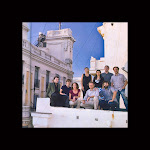29 de septiembre de 2016
160928 - Letters to the Mayor/ Cartas a la Alcaldesa
::: La exposición "Letters to the Mayor/ Cartas a la Alcaldesa", promovida y comisariada por Eva Franch (Storefront for Art and Architecture), reúne las cartas de arquitectos madrileños a la alcaldesa con ideas innovadoras y visiones para la ciudad de Madrid / The exhibition "Letters to the Mayor", promoted and curated by Eva Franch (Storefront for Art and Architecture), will present letters from Madrid-based architects addressed to the city's mayor, with innovative ideas and visions for the city ::: Os esperamos este VIERNES A LAS 14:00 en el COAM - Colegio Oficial de Arquitectos de Madrid, estáis todos invitados / We invite you to join us THIS FRIDAY 30TH at 2PM at COAM - Colegio Oficial de Arquitectos de Madrid :::
23 de septiembre de 2016
160923 - Premio COAM 2016 !
::: Biombombastic ha sido galardonada con el Premio COAM 2016, otorgado por el COAM - Colegio Oficial de Arquitectos de Madrid / Biombombastic has been awarded with the prize COAM 2016, given by the College of Architects of Madrid ::: ¡Gracias al Colegio y al jurado! / Thanks to the College and the jury! ::: Acta del jurado /
Minutes of the jury :::
http://www.coam.org/media/Default%20Files/servicios/concursos/concursos_ocam/2016/premios_coam/160907_premiosCOAM_2016_acta.pdf
Minutes of the jury :::
http://www.coam.org/media/Default%20Files/servicios/concursos/concursos_ocam/2016/premios_coam/160907_premiosCOAM_2016_acta.pdf
10 de septiembre de 2016
160912 - PRESENTACIÓN DEL CURSO
::: Presentación del curso / Presentation of the Course ::: Gabinete de Crisis de Ficciones Políticas /
Crisis Cabinet of Political Fictions ::: Conferencia por / Lecture by: Uriel Fogué ::: Ud. / Unit Lapuerta ::: Lunes 12 de septiembre de 2016 / Monday 12th September 2016 ::: 19h :::
Crisis Cabinet of Political Fictions ::: Conferencia por / Lecture by: Uriel Fogué ::: Ud. / Unit Lapuerta ::: Lunes 12 de septiembre de 2016 / Monday 12th September 2016 ::: 19h :::
Etiquetas:
CONFERENCIA,
DOCENCIA,
PRESENTACIÓN
6 de septiembre de 2016
160901 - GCFP / CCPF
::: … De repente, la máquina comenzó a asesinar gente… / … All of a sudden, the machine started to murder people… ::: Primero, a enfermos terminales, luego, a reincidentes de evasión fiscal. SIMULACRUM (c)* mata en nombre del derecho a vivir pacíficamente de “la gente normal” y de la solvencia económica del sistema / First, terminally ill patients, afterwards, recidivist tax evaders. SIMULACRUM (c)*starts to kill in the name of the right of ‘the normal people’ to live peacefully and in the name of the economic solvency of the system ::: El Gabinete de Crisis se enfrentó a un escenario crítico: ¿Debíamos desconectar a SIMULACRUM (c)? ¿Debíamos aceptar esta forma de gobernanza necropolítica en favor de los intereses de la mayoría que se ajusta a la ley? ¿Estábamos dispuestos a pasar por otra crisis económica, al prescindir de sus capacidades de gestión? ¿Teníamos derecho a desconectar a SIMULACRUM (c), una vez que comenzaba a dar signos de conciencia e inteligencia (artificial)? ¿Había nacido una nueva forma de vida? ¿Estábamos respondiendo al asesinato con otro modo de asesinato? ¿Podíamos / debíamos hackear su sistema? ¿Puede ser la “idiotez” o el comportamiento impredecibles, la única posibilidad de resistencia, ante los espacios de control? ¿Debíamos aprender a convivir con SIMULACRUM (c)? ¿Cómo integramos estas nuevas “especies” en nuestros ecosistemas y nuestros marcos de cohabitación? Si aprende de nuestros comportamientos ¿podíamos enseñarle a cuidarnos? ¿Podría SIMULACRUM (c) integrar en sus protocolos otras prácticas, como el deseo o el placer, más allá de la funcionalidad y la eficiencia? ¿Debíamos delegar en la tecnología todavía más competencias, como la reproducción, para desafiar la normatividad imperante? ¿Es adecuada la dicotomía “nosotros” (humaidad) / “ello” (SIMULACRUM (c))? / The Crisis Cabinet faced a critical scenario:
Should we disconnect SIMULACRUM (c)? Should ‘we’ accept this way of necropolitical governance in the interest of the majority that followed the law? Were ‘we’ ready to go through another economic crisis, once ‘we’ dispense with its management abilities? Did ‘we’ have the right to disconnect SIMULACRUM (c), after it started to show signs of awareness and (artificial) intelligence? Was a new way of life born? Were ‘we’ answering to murder with more murder? Could / Should ‘we’ hack its system? Can ‘idiocy’ or other ways of unpredictable behaviours be the only possible way of resistance, in spaces of control? Should ‘we’ learn to get along and live together with SIMULACRUM (c)? How do ‘we’ integrate these new ‘species’ in our ecosystems and our spaces of cohabitation? If it learns from our behaviours, could ‘we’ teach it to take care of ‘us’? Could SIMULACRUM (c) integrate in its protocols other practices, such as desire or pleasure, beyond functionality and efficiency? Should ‘we’ delegate in technology even more competences, such as reproduction, in order to challenge the dominant normativity? Is it adequate the dichotomy ‘us’ (humanity) / ‘It (SIMULACRUM (c))’? ::: ... Pero sobre todo… ¿Estaba el Gabinete afrontando la situación con los vocabularios adecuados? ¿No estábamos asumiendo una perspectiva demasiado humanista para interpretar de una manera apropiada los hechos? / ... But, above all... was the Cabinet facing the situation with the adequate vocabularies? Weren’t ‘we’ assuming a still too humanistic perspective to interpret properly these facts? ::: Muchísimas gracias a Nerea Calvillo, Pablo Hermassen y Martin Tironi, a toda la gente que participasteis como expertos en el VI Gabinete de Crisis de Ficciones Políticas y a todos los organizadores del #4sEASST2016 CONFERRENCE BCN - Science + technology by other means / Many thanks to Nerea Calvillo, Pablo Hermassen and Martin Tironi, to all the people that participated in the VIth Crisis Cabinet of Political Fictions, and to everybody who organised #4sEASST2016 CONFERRENCE BCN - Science + technology by other means ::: * SIMULACRUM (c) es el nombre del prototipo basado en inteligencia artificial, desarrollado para la gestión del metabolismo urbano de un barrio de la ciudad Hereandnow
/ * SIMULACRUM (c) is the name of a prototype based in artificial intelligence, developed for the management of the urban metabolism of a neighbourhood of the city Hereandnow. :::
Should we disconnect SIMULACRUM (c)? Should ‘we’ accept this way of necropolitical governance in the interest of the majority that followed the law? Were ‘we’ ready to go through another economic crisis, once ‘we’ dispense with its management abilities? Did ‘we’ have the right to disconnect SIMULACRUM (c), after it started to show signs of awareness and (artificial) intelligence? Was a new way of life born? Were ‘we’ answering to murder with more murder? Could / Should ‘we’ hack its system? Can ‘idiocy’ or other ways of unpredictable behaviours be the only possible way of resistance, in spaces of control? Should ‘we’ learn to get along and live together with SIMULACRUM (c)? How do ‘we’ integrate these new ‘species’ in our ecosystems and our spaces of cohabitation? If it learns from our behaviours, could ‘we’ teach it to take care of ‘us’? Could SIMULACRUM (c) integrate in its protocols other practices, such as desire or pleasure, beyond functionality and efficiency? Should ‘we’ delegate in technology even more competences, such as reproduction, in order to challenge the dominant normativity? Is it adequate the dichotomy ‘us’ (humanity) / ‘It (SIMULACRUM (c))’? ::: ... Pero sobre todo… ¿Estaba el Gabinete afrontando la situación con los vocabularios adecuados? ¿No estábamos asumiendo una perspectiva demasiado humanista para interpretar de una manera apropiada los hechos? / ... But, above all... was the Cabinet facing the situation with the adequate vocabularies? Weren’t ‘we’ assuming a still too humanistic perspective to interpret properly these facts? ::: Muchísimas gracias a Nerea Calvillo, Pablo Hermassen y Martin Tironi, a toda la gente que participasteis como expertos en el VI Gabinete de Crisis de Ficciones Políticas y a todos los organizadores del #4sEASST2016 CONFERRENCE BCN - Science + technology by other means / Many thanks to Nerea Calvillo, Pablo Hermassen and Martin Tironi, to all the people that participated in the VIth Crisis Cabinet of Political Fictions, and to everybody who organised #4sEASST2016 CONFERRENCE BCN - Science + technology by other means ::: * SIMULACRUM (c) es el nombre del prototipo basado en inteligencia artificial, desarrollado para la gestión del metabolismo urbano de un barrio de la ciudad Hereandnow
/ * SIMULACRUM (c) is the name of a prototype based in artificial intelligence, developed for the management of the urban metabolism of a neighbourhood of the city Hereandnow. :::
3 de septiembre de 2016
160902 - LIVING (IN) BLACK BOXES
::: The term ‘black box’ is among the recurring vocabulary of STSs. It is usually understood as a series of technological processes that run invisibly within efficient socio-technical frameworks. The technological black box has been a fruitful concept in many fields in architecture. However, there is another use of the term ‘black box’ beyond architecture. In the field of performing arts, the black box is the space formed by the stage of a theatre. These two views of the concept of ‘black box’ can be seen to share a ‘happy coincidence’. Or they can be seen as a chance to extend the notion of black box that is usually employed in the STSs, such as architecture. How can this second notion of stage black box extend the notions of ‘technological black box’? ::: Uriel Fogué's lecture ‘Domestic theatres: living (in) black boxes’, Friday 2nd September, at 4pm! :::
* Track: ‘Doing theory by other means: how does architectural production challenge STS and ANT’
* Convenors: Nerea Calvillo, Ignacio Farias
* Discussant: Michael Guggenheim
* Authors: Lucas Pohl (Goethe University Frankfurt), Nerea Calvillo (University of Warwick), Alfonso Borragan and Blanca Pujals (Etsab and Independent Studies Program (Macba Museum, Bcn), Aino Alatalo (University of Tampere), Monika Kurath (ETH Zurich), Bernhard Böhm (ETH Zurich), Kåre Poulsgaard (University of Oxford), Enrique Nieto (University of Alicante), Uriel Fogue (Universidad Europea / Elii), Miguel Mesa del Castillo(Universidad de Alicante), Ariane d'Hoop (Université Libre de Bruxelles), Ignacio Farias (TU München) and Gonzalo Correa (Universidad de la República).
4S/EASST CONFERRENCE BCN 2016
Science + technology by other means
Barcelona!
+ info:
http://www.nomadit.co.uk/easst/easst_4s2016/panels.php5?PanelID=4001
* Track: ‘Doing theory by other means: how does architectural production challenge STS and ANT’
* Convenors: Nerea Calvillo, Ignacio Farias
* Discussant: Michael Guggenheim
* Authors: Lucas Pohl (Goethe University Frankfurt), Nerea Calvillo (University of Warwick), Alfonso Borragan and Blanca Pujals (Etsab and Independent Studies Program (Macba Museum, Bcn), Aino Alatalo (University of Tampere), Monika Kurath (ETH Zurich), Bernhard Böhm (ETH Zurich), Kåre Poulsgaard (University of Oxford), Enrique Nieto (University of Alicante), Uriel Fogue (Universidad Europea / Elii), Miguel Mesa del Castillo(Universidad de Alicante), Ariane d'Hoop (Université Libre de Bruxelles), Ignacio Farias (TU München) and Gonzalo Correa (Universidad de la República).
4S/EASST CONFERRENCE BCN 2016
Science + technology by other means
Barcelona!
+ info:
http://www.nomadit.co.uk/easst/easst_4s2016/panels.php5?PanelID=4001
Etiquetas:
COMUNICACIÓN,
CONFERENCIA,
CONGRESO,
PRESENTACIÓN,
SEMINARIO
Suscribirse a:
Comentarios (Atom)














![[inter]sección de Filosofía y Arquitectura](http://3.bp.blogspot.com/_Awsby2KXw-Y/S_f6NdsAPWI/AAAAAAAAAOU/0-uT7zcKiPM/S220/10-CARTEL+interseccion.jpg)

